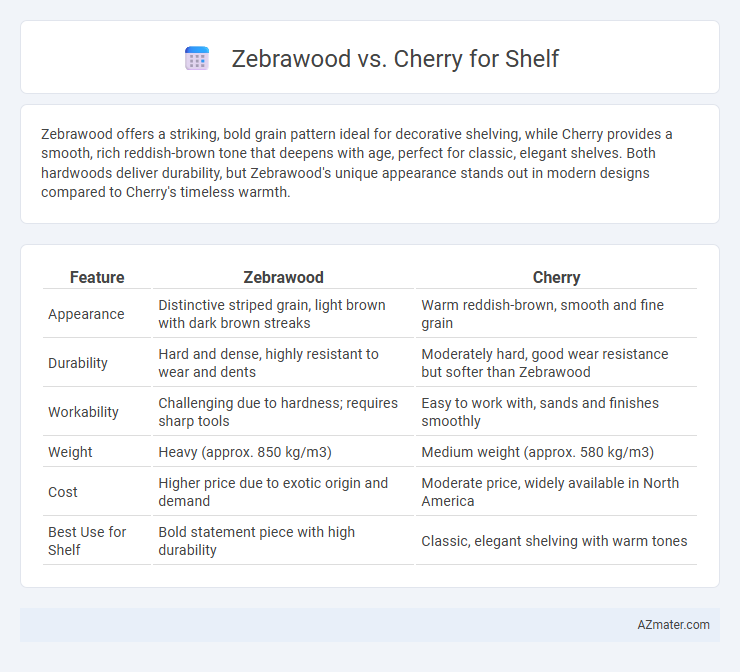Zebrawood offers a striking, bold grain pattern ideal for decorative shelving, while Cherry provides a smooth, rich reddish-brown tone that deepens with age, perfect for classic, elegant shelves. Both hardwoods deliver durability, but Zebrawood's unique appearance stands out in modern designs compared to Cherry's timeless warmth.
Table of Comparison
| Feature | Zebrawood | Cherry |
|---|---|---|
| Appearance | Distinctive striped grain, light brown with dark brown streaks | Warm reddish-brown, smooth and fine grain |
| Durability | Hard and dense, highly resistant to wear and dents | Moderately hard, good wear resistance but softer than Zebrawood |
| Workability | Challenging due to hardness; requires sharp tools | Easy to work with, sands and finishes smoothly |
| Weight | Heavy (approx. 850 kg/m3) | Medium weight (approx. 580 kg/m3) |
| Cost | Higher price due to exotic origin and demand | Moderate price, widely available in North America |
| Best Use for Shelf | Bold statement piece with high durability | Classic, elegant shelving with warm tones |
Introduction to Zebrawood and Cherry
Zebrawood is a dense hardwood known for its striking striped grain pattern, making it a popular choice for decorative shelving with a bold, exotic appearance. Cherry wood offers a warm reddish-brown hue that deepens with age, favored for elegant, classic shelving designs that emphasize smooth texture and fine grain. Both woods provide durable and stable options, but Zebrawood stands out for its unique visual impact, while Cherry is prized for its timeless beauty and workability.
Appearance and Aesthetics Comparison
Zebrawood features a striking grain with bold, dark stripes against a light golden-brown background, creating a dramatic and exotic look ideal for statement shelves. Cherry wood offers a warm, rich reddish-brown tone that deepens to a smooth patina over time, providing a classic and elegant appearance. The high contrast patterns of Zebrawood make it perfect for modern or eclectic decor, while Cherry's subtle grain and uniform color suit traditional and timeless shelf designs.
Durability and Hardness Differences
Zebrawood offers superior durability and hardness compared to cherry, with a Janka hardness rating of approximately 1570, making it highly resistant to dents and scratches, ideal for heavy-use shelving. Cherry wood, with a Janka hardness around 950, is softer and more prone to wear but provides a smoother finish and ages gracefully with rich patina over time. Choosing zebrawood enhances shelf longevity in high-traffic areas, while cherry shelves excel in aesthetic warmth and moderate durability.
Workability for Shelf Construction
Zebrawood offers moderate workability with its coarse texture and interlocking grain, which may require sharp tools and careful handling during shelf construction. Cherry wood is highly prized for its smooth grain, ease of sanding, and excellent finish, making it a preferred choice for intricate shelf designs and precise joinery. For durable and aesthetically pleasing shelves, cherry wood provides superior workability compared to the more challenging handling of zebrawood.
Cost and Availability
Zebrawood is generally more expensive than cherry wood due to its exotic origin and limited supply, making it less readily available in local lumber stores. Cherry wood is widely available and cost-effective, often preferred for shelves in residential woodworking projects because of its consistent supply and affordability. The price difference can be significant, with zebrawood commanding premium rates for its distinctive grain and rarity compared to cherry's moderate pricing and ease of procurement.
Maintenance and Longevity
Zebrawood shelves require regular oiling to maintain their distinct striped appearance and prevent drying out, while cherry wood shelves benefit from occasional polishing to enhance their rich, warm tones and resist scratches. Zebrawood is highly durable but can be sensitive to moisture changes, necessitating controlled indoor environments to prolong lifespan. Cherry wood typically ages gracefully, developing a deeper patina over time, making it a long-lasting choice with proper care and minimal exposure to direct sunlight.
Weight and Load-Bearing Capacity
Zebrawood offers higher density and weight compared to Cherry, making it more suitable for heavy-load shelving due to its superior load-bearing capacity. Cherry has a medium weight and moderate strength, which makes it ideal for lighter shelving applications where aesthetics and ease of workability are priorities. For shelves requiring maximum durability and ability to hold substantial weight, Zebrawood is a more effective choice.
Environmental Impact and Sustainability
Zebrawood, sourced primarily from West African tropical rainforests, faces significant sustainability challenges due to overharvesting and habitat destruction, making certified FSC zebrawood a crucial choice for eco-conscious consumers. Cherry wood, predominantly harvested in North America, often comes from more sustainably managed forests with faster regeneration rates, resulting in a lower ecological footprint compared to zebrawood. Choosing cherry wood for shelves typically supports better environmental outcomes through reduced deforestation risks and more responsible forest management practices.
Best Uses for Zebrawood and Cherry Shelving
Zebrawood is ideal for shelving that demands a bold, exotic appearance and high durability, fitting well in modern or eclectic interiors due to its distinctive striped grain and natural strength. Cherry wood offers a warm, rich finish that deepens over time, making it perfect for traditional or elegant shelving where a smooth surface and fine craftsmanship are valued. Both woods provide sturdy options, but Zebrawood excels in high-impact, statement pieces, while Cherry complements refined, classic designs.
Final Verdict: Which Wood is Better for Shelves?
Zebrawood offers exceptional durability and a striking, unique grain pattern that adds a bold aesthetic to shelves, making it ideal for statement pieces in high-traffic areas. Cherry wood provides a warm, rich color that deepens over time with exceptional smoothness, suited for classic and elegant shelf designs. For shelves requiring both strength and eye-catching appeal, Zebrawood is superior, while Cherry excels in environments prioritizing refined beauty and gradual patina development.

Infographic: Zebrawood vs Cherry for Shelf
 azmater.com
azmater.com